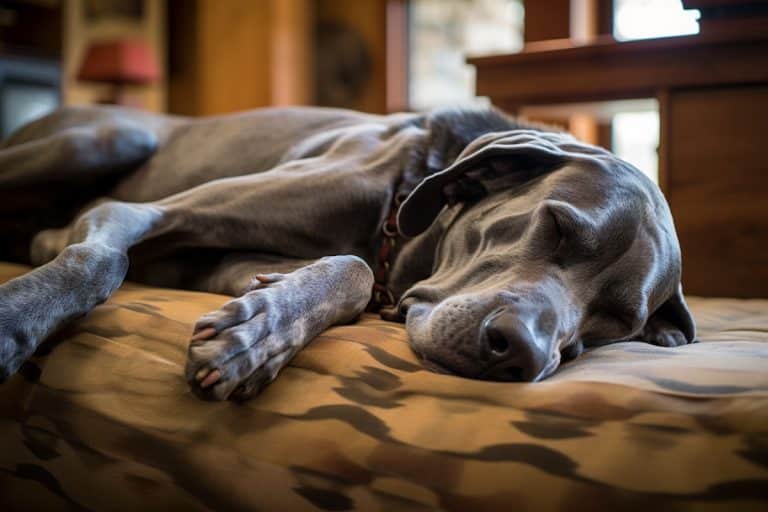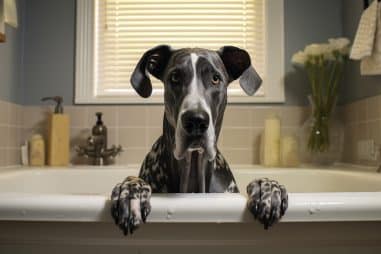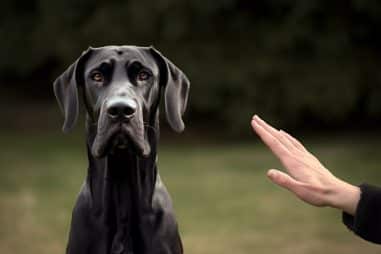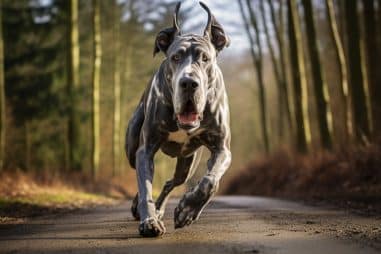The majestic Great Dane, known for its towering stature and gentle nature, often leaves its owners curious about its sleep patterns. Sleep isn’t just a time for dreaming of chasing squirrels, it’s essential for your Great Dane’s overall health and wellbeing. This guide delves into the sleepy world of Great Danes, unearthing what influences their slumber and how you can ensure they’re getting the rest they need.
Understanding the Sleep Cycle of Dogs
When you spot your Great Dane curled up and peacefully dozing off, it’s engaging in something crucial for its health. Much like humans, dogs have their sleep cycles, but they tend to snooze more intermittently throughout the day. Unlike the human cycle of deep sleep to REM (Rapid Eye Movement), dogs enter the REM phase quicker and more frequently. Great Danes, with their calm disposition, might spend a lot of their day napping away. Their sleep cycle is not vastly different from other breeds, but their large bodies do demand ample rest to keep them rejuvenated and healthy.
Factors Affecting a Great Dane’s Sleep
A variety of factors can influence how much your Great Dane sleeps. Here are a few key considerations:
Age
- Puppies: Little Great Dane puppies are like babies, requiring a whopping 18 to 20 hours of sleep per day, which is essential for their growth.
- Adults: Adult Great Danes may sleep anywhere from 12 to 14 hours a day, a mix of nighttime sleep and naps during the day.
- Seniors: Older Great Danes might sleep more, sometimes up to 16 to 18 hours a day as their energy levels dip.
Health
Your dog’s health plays a pivotal role in its sleep pattern. A healthy Great Dane might stick to the average sleep hours, but if your pet is feeling unwell, it might sleep more. Conversely, discomfort might cause restlessness and less sleep.
Activity Level
An active Great Dane who exercises regularly will need more sleep to restore energy and repair muscles. Ensure your dog gets adequate exercise to promote better sleep and overall health.
Environment
A quiet, comfy, and safe environment promotes better sleep. Ensure your dog has a comfy bed that accommodates its large size, placed in a serene spot away from noise and disturbances.
How Much Sleep Does a Great Dane Need?
You’ve seen how various factors play into your Great Dane’s sleep. On average, adult Great Danes need about 12 to 14 hours of sleep. However, this can extend to 18 hours or more for puppies and older dogs. It’s vital to observe your dog and understand its unique sleep needs, adjusting its routine and environment accordingly to promote better sleep.
Impact of Insufficient Sleep
Just like people, Great Danes need a good amount of sleep to function well. When your Great Dane doesn’t get enough sleep, it can have a ripple effect on its behavior and overall health. It’s much like when you skimp on sleep; you might feel grumpy, have trouble focusing, or even catch a cold easily. The same goes for your gentle giant. Here’s a breakdown of the potential fallout from insufficient sleep:
Behavioral Changes
Lack of sleep can lead to noticeable changes in your Great Dane’s behavior. Your normally placid and friendly dog might become irritable or agitated. They might react differently to familiar people or other animals. You might also notice a lack of enthusiasm for walks or playtime. Just think about how cranky you can get with too little sleep; it’s similar for your Great Dane.
Physical Health
Sleep is when the body gets to work repairing and restoring itself. For Great Danes, this restorative process is crucial due to their large size and the physical demands it places on their body. When they don’t get enough sleep:
- Their immune system might take a hit, making them more susceptible to illnesses.
- The body’s healing processes slow down, which isn’t good news if your Great Dane is recovering from an injury or illness.
- They might gain weight as their metabolism slows down, and this extra weight can be tough on a Great Dane’s already prone-to-issues joints.
Mental Health
Yes, dogs have mental health too! Lack of sleep can leave your Great Dane feeling stressed or anxious. It might become more clingy, have trouble with training commands it knew before, or even have accidents in the house. Sleep is crucial for your dog’s cognitive functions. It helps in memory consolidation and learning, which is why puppies sleep a ton.
Creating a Comfortable Sleeping Environment
Crafting a cozy sleeping haven is a step towards ensuring your Great Dane gets the rest it requires.
- Choose a large, comfortable bed that supports your dog’s body.
- Place the bed in a quiet corner away from the hustle and bustle.
- Maintain a consistent temperature, neither too hot nor too cold, to make sleep more inviting.
Training Your Great Dane to Sleep Well
Establishing a routine helps in inculcating good sleep habits in your Great Dane. Regular exercise, consistent feeding times, and a bedtime routine can help signal your dog that it’s time to wind down. Training your dog to adhere to a sleep schedule not only benefits your dog but also aligns well with your daily schedule, creating a harmonious living situation for both.
Conclusion
Your Great Dane’s sleep is a window into its overall health and happiness. By understanding what affects their sleep and how to promote a restful environment, you’re steps closer to ensuring your gentle giant leads a happy, healthy life. So, the next time your Great Dane drifts into dreamland, you’ll know you’ve done your part in providing the best care for your loyal companion.








